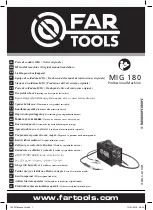
ELECTRO-VOICE
®
X-Line Very Compact
TM
Rigging Manual
35
3. Rigging-Strength Ratings, Safety Factors, and
Special Safety Considerations
3.1 Working-Load Limit and Safety Factor Definitions
The structural ratings for all of the XLVC rigging components and complete loudspeaker systems
are based on test results in which parts were stressed to failure. Manufacturers typically present
the structural-strength ratings of mechanical components or systems as either the working-load
limit (WLL) or the ultimate-break strength. Electro-Voice chooses to present the structural-load
ratings of the XLVC loudspeaker systems as the working-load limit. The working-load-limit rating
represents the maximum load that should ever be applied to a mechanical component or system.
THE USER SHOULD NEVER APPLY A LOAD THAT EXCEEDS THE WORKING-
LOAD LIMITS OF ANY OF THE RIGGING COMPONENTS OR COMPLETE
LOUDSPEAKER SYSTEMS DESCRIBED IN THIS MANUAL.
The working-load limits for the XLVC rigging components and complete loudspeaker systems
described in this manual are based on a minimum of an 8:1 safety factor. The safety factor is
defined as the ratio of the ultimate-break strength divided by the working-load limit, where the
ultimate-break strength represents the force at which a part will structurally fail. For example, if a
part has working-load limit of 1,000 lb (454 kg), it would not structurally fail until a force of at least
8,000 lb (3,629 kg) was applied, based on a 8:1 safety factor. However, the user should never
apply a load to that part that exceeds 1,000 lb (454 kg). The safety factor provides a margin of
safety above the working-load limit to accommodate normal dynamic loading and normal wear.
CAUTIONS for Working-Load Limits and Safety Factors
The working-load limits defined by the manufacturer of any rigging component should never be
exceeded. Electro-Voice bases the working-load limits of its XLVC products on a minimum of an
8:1 safety factor. Other manufacturers of rigging components may base their working-load limits
on safety factors other than 8:1. For example, 5:1 safety factors are fairly common amongst
rigging manufacturers because many regulatory agencies call for a minimum safety factor of 5:1.
When an XLVC loudspeaker system is installed where local regulations only require a safety
factor of 5:1, Electro-Voice insists that the working-load limits of the XLVC rigging never be
exceeded and that an 8:1 safety factor be maintained for the XLVC loudspeakers.
The user is cautioned that some local regulations may require safety factors higher than 8:1. In
that circumstance, Electro-Voice insists that the user maintain the higher safety factor as required
by the local regulations throughout the entire XLVC installation. It is the responsibility of the user
to make sure that any XLVC installation meets any applicable local, state or federal safety
regulations.
















































